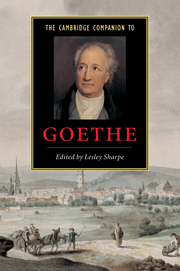Book contents
- Frontmatter
- Introduction
- 1 The world Goethe lived in
- 2 Goethe the writer and literary history
- 3 Goethe the poet
- 4 Goethe the dramatist
- 5 Faust
- 6 Weimar Classicism
- 7 Goethe and the Weimar theatre
- 8 Goethe’s prose fiction
- 9 Autobiographical writings
- 10 In defence of experience
- 11 Goethe and gender
- 12 Goethe and the visual arts
- 13 Goethe and the political world
- 14 Religion and philosophy
- 15 Reception in Germany and abroad
- A guide to further reading
- Index
3 - Goethe the poet
Published online by Cambridge University Press: 28 May 2006
- Frontmatter
- Introduction
- 1 The world Goethe lived in
- 2 Goethe the writer and literary history
- 3 Goethe the poet
- 4 Goethe the dramatist
- 5 Faust
- 6 Weimar Classicism
- 7 Goethe and the Weimar theatre
- 8 Goethe’s prose fiction
- 9 Autobiographical writings
- 10 In defence of experience
- 11 Goethe and gender
- 12 Goethe and the visual arts
- 13 Goethe and the political world
- 14 Religion and philosophy
- 15 Reception in Germany and abroad
- A guide to further reading
- Index
Summary
Approaching Goethe’s poetry
If we associate hexameter with Homer and Virgil, distichs with the Latin elegiac and satirical poets, terza rima, ottava rima, and the sonnet with Dante and the Italian Renaissance poets, the sonnet and iambic pentameter with Shakespeare, the alexandrine with Victor Hugo and even Baudelaire, there is no particular poetic form we can immediately associate with Goethe; he wrote in all these forms and many, many more. Indeed, Goethe's supreme gift is that of convincing the reader that his chosen lyrical form, and no other, is the appropriate one for the expression of a particular poetic statement. His historical situation at a vibrant stage in the development of German language and literature, a time when the culture was becoming self-consciously German and yet was also highly receptive to foreign influences, his position at the threshold of European Romanticism, which he did much to shape and further, determined the scope and variety of his eclectic lyrical output – allied with an outstanding gift of poetic articulation, a quasi-magical command of language that suggests, no doubt misleadingly, that he was someone to whom poetic expression came as easily and as naturally as eating or breathing. Poetic language and expression informs and characterizes the whole range of Goethe's writing, quite particularly his verse dramas, but also much of his prose fiction, his private correspondence, and even some of his scientific work, the results of which were frequently expressed in lyrical form, in verse epigrams, or in longer didactic poems.
- Type
- Chapter
- Information
- The Cambridge Companion to Goethe , pp. 42 - 65Publisher: Cambridge University PressPrint publication year: 2002
- 1
- Cited by



